As photographed at the Príncipe Pío mall on December 26. I was surprised, too. Spain’s little ones see Santa on TV, explained one Madrileña, clamor pitilessly to lobby the Bearded One for merch east of the Atlantic, too.
Still a relative novelty in Spain, and not uncontroversial. What was so terrible about waiting for gifts from the Three Kings on Epiphany? Isn’t that what kids are supposed to do in Spain?
‘We’re being colonized,’ laments actor Karra Elejalde. ‘Black Friday, Halloween, Santa.’
For those resentful of the trend, a retired elementary school teacher can offer a simple solution:
Parents, tell your kids that Santa loves Spain’s children more than any others in the whole wide world, and thus can bear only to leave the most healthful gifts under Spanish Christmas trees: carrot sticks, say, or broccoli florets, or extra homework. Get the other parents to back you up and Spain’s Santa will retreat quietly into the Picos.
A COUNTRY READY FOR SOCIALISM?
This subhead should not suggest that I am ready for socialism. My feelings are mixed. Twitter’s Elon Musk has recently shown us that a CEO can tank a business as quickly as a pol can tank a country, but I still associate most such wreckage with the public sector.
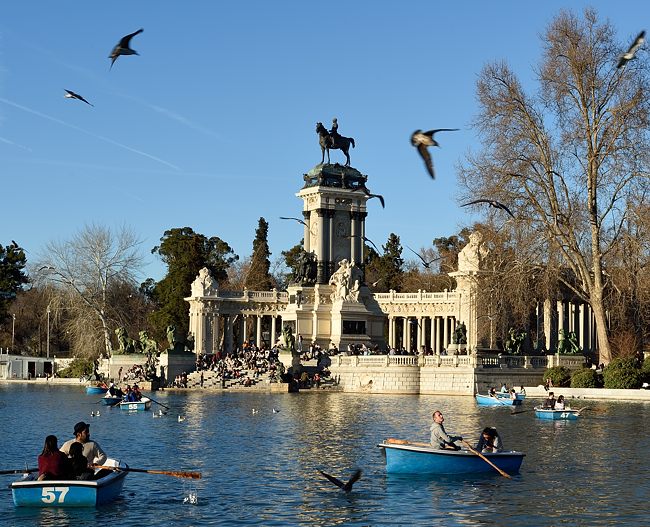
G.W. Bush, hundreds of thousands killed and trillions squandered for nothing in the Iraq War. (A war that inspired colossal protests in Madrid, incidentally.) Hugo Chávez, the destruction of PDVSA and the whole Venezuelan economy. Vladimir Putin, Ukraine; Xi Jinping, China Covid policy. Nayib Bukele, El Salvador’s all-chips-on-the-table bet on crypto. Business leaders seen as evil by some activists could at least be acknowledged as ‘evildoers’ who know how to run their enterprises.
But, I wonder: is Spain collectively much more receptive to socialism than I am?
‘That’s not true!’ many Spaniards would sputter, and point indignantly to the Popular Party, or to far-right Vox. I hear them, but wonder if a Yankee outsider may see something about Spain that Spain doesn’t understand about itself.
The Popular Party is indeed the descendant of Manuel Fraga and the Franco dictatorship, but Madrid leader Isabel Ayuso of the PP noted that she would be seen in the U.S. as midway between Republicans and Democrats. As for Vox, I remember my amazement in March when I wandered past a Vox-organized protest against energy prices. What kind of “far-right” party would demand that government take ‘drastic measures’ to bring energy prices down? A Spain AOC, perhaps, but Vox?
Spain’s far right seems to serve often as a conservative focal point for social issues. Immigration. LGBT, women’s rights, national pride, relations with EH Bildu and other pro-independence parties, the place of the Catholic church and, I don’t doubt, bullfighting. But economic benefits from the European Union welfare state? Those benefits are a different story, valued by almost everyone.
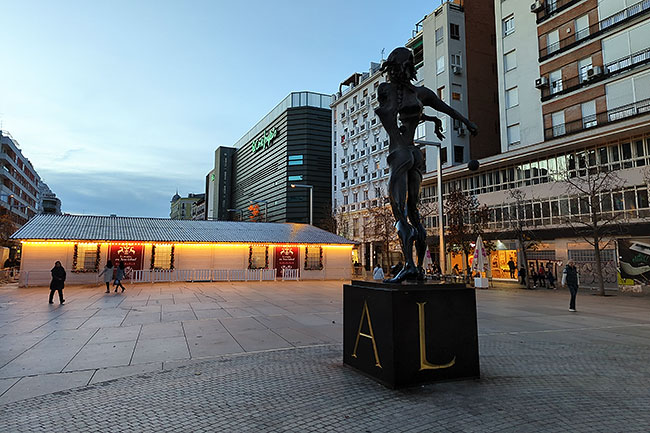
I haven’t met fiercely ambitious Spaniards. I see a public that strives for security: a stable job, that will pay the hipoteca for a reasonable piso and a modest yearly vacation, perhaps to a low-key hamlet on the Andalucia coast as yet undiscovered by tourists. “Tim, no one in Spain ‘lives to work,'” assured one right-leaning Spaniard. Family and friends come first.
Las oposiciones are the main vocational rite of passage: byzantine, Kafkaesque, an employment limbo in which one may wait interminable months for an unannounced exam date, and compete in some exams one feels certain to flunk, only to gain experience for the exam that one might reasonably hope to pass in the future. The dream: to become a full-fledged funcionario in the field of one’s choice, assured of salary, retirement, benefits. But even if one never qualifies, must labor indefinitely as an interino, without job security, the EU welfare state provides a backstop. A teacher friend doesn’t fear retiring as an interino.
Further, the Spaniard willing to dig can find a wide variety of perks, subsidies, supplements, special programs to ease one’s fiscal path through life. A bonus here, a discount there. Two natives referred to Spain as “the land of the subsidy.” The EU welfare state is a backstop, a protector.
I underscore my mixed feelings. I think Spain badly needs a stronger private sector, regard a cutting-edge company like, say, ASML as a major feather-in-the-cap for the Netherlands.¹
POST-PANDEMIC HEALTH CARE PROBLEMS
As described to me by a médica de cabecera in a private chat.
(A private chat in late September, incidentally, which should tell you what kind of Spain breaking news coverage you should expect here. Be sure to check transitophile this summer for news of the crypto collapse and Queen Elizabeth’s funeral.)
The pandemic took a much larger personal toll on medical professionals than most realize, she said. She fell ill with Covid early, like many others on the health care front lines. Some colleagues became gravely ill.
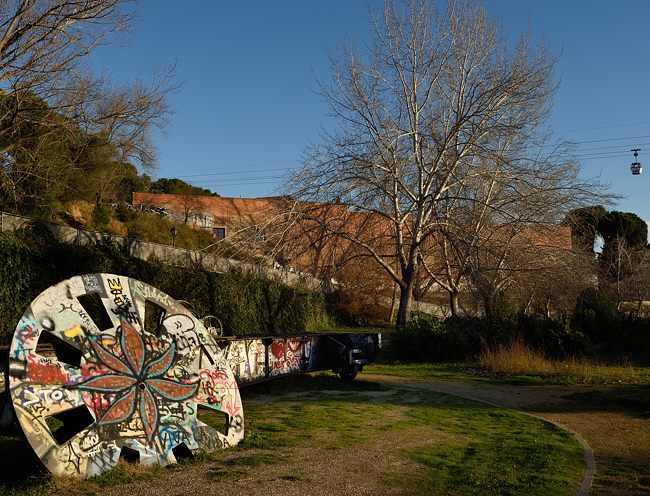
She made house calls during the lockdown months, sometimes visited four patients in the morning, four in the afternoon. Before entering each residence, she had to don a cumbersome ‘EPI,’ then take it off after leaving.
In the worst months, she said, Madrid practiced a kind of triage. Admission to jammed hospitals favored the young, who had more life years to lose and were likelier to survive treatment. Health system higher-ups quietly provided doctors with sedation instructions, to relieve the suffering of a terminally ill patient met in a home visit. (Sedation, for a patient unquestionably bound for death, and emphatically not euthanasia, to induce death.) She dreaded that she would have to administer such sedation, but never did.
The aftermath, post peak pandemic: a seriously weakened system. Many doctors are still on leave, or have quit. She laments most that Madrid is not retaining the doctors trained, that only a fraction remain in Madrid after graduating. They head elsewhere, if only for reasonable working conditions. The word has spread about the tough life of a family doctor in Madrid.
For political reasons, she feels, Madrid was eager to re-open urgencias centers closed during the pandemic. A nice gesture, but some of these centers reopened without doctors on staff! An arriving patient in dire straits might have been attended only by a nurse, or by a M.D. available only by video conference.
I punt to a couple of Spanish articles — here, here — and an English article on related protests.

In spite of these problems, I will note:
(♦) A Madrileño who regularly arranges public sector medical appointments for a sick parent is still able to book everything that parent needs, albeit often with a greater delay than in years past. The doctors I know in Madrid have complained more of system failings than have clients. ²
(♦) Although I could now receive public health benefits, I continue to pay about €230 a month for a no-deductible plan from private sector Sanitas. I have struggled to get ordinary flu vaccines through Sanitas, but am otherwise satisfied with service through the plan, which I’d rate a notch or two above Kaiser in California. Further, a quick overseas glance at
kaiserpermanente.org suggests that I’d pay vastly — and I do mean vastly — more for an equivalent plan in California, at least without using Medicare.
CHRISTMAS LOTTERY
Expect to see lines like this at state Loterías outlets if visiting central Madrid in December. The hopeful queue to buy tix for the annual Christmas lottery, a Spain tradition for more than two centuries. A sheet of ten tickets goes for €200. Participants generally spring for €20 décimos, which may be given to family, friends, and colleagues in office betting pools.
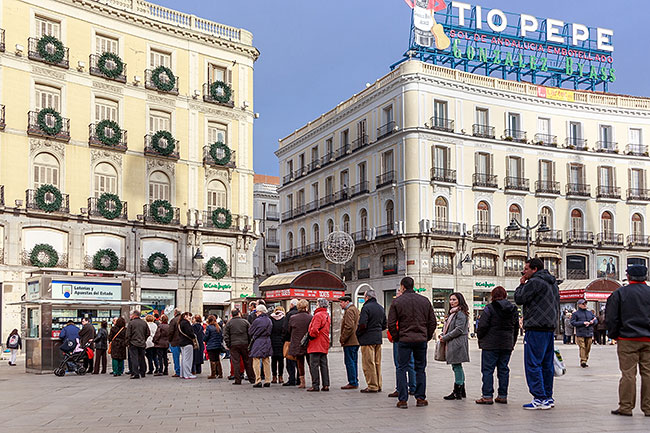
Some of the commercials are excellent, with actors I recognize from my collection of Spanish movies.
The date and place of the big drawing: December 22, at the Teatro Real near the Ópera station. On the evening of December 21 — a cold December 21, incidentally — I passed faithful prepared to camp overnight next to the building, to be assured of entry to see the big ceremony the next day.
A tradition. I didn’t grow up here and don’t feel it in my bones, just as Europeans in the States may scratch heads while encountering deserted restaurants on Super Bowl Sunday.
BULLFIGHTING R.I.P.
La tauromaquia is now obviously on the way out, and won’t be revived. You can call the mortician, make an appointment. Maybe not for ’24, but for ’34, or ’44. La suerte está echada.
Will animal rights activists forgive my concern for merchants dependent on a nearly-extinct tradition? Many Mom-and-Pop businesses in Pamplona live and die by San Fermin’s success.
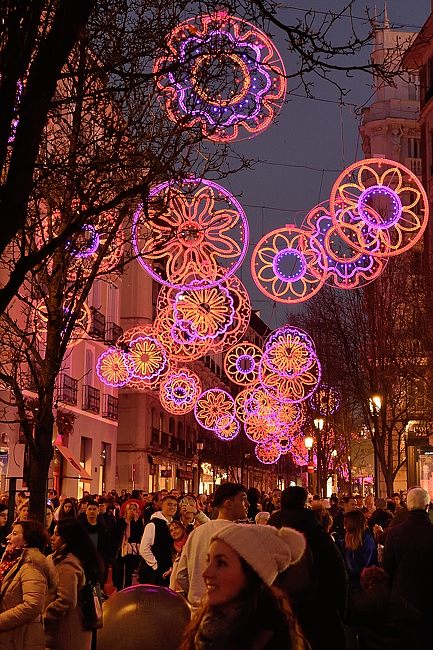
Could the running of the bulls be preserved, I wonder, without the slaughter of the stars at event end? That’s not a bad gig for a ranch animal. Hang out in the pasture all day, work holidays only, sprint a few blocks, gore an occasional drunk. Beats being a Holstein. How many humans have such easy work?
(Maybe the late actor Dick Wilson, who pulled in a yearly $300K for two weeks work — almost $800K, in today’s coin — while tormenting millions of U.S. TV viewers as Mr. Whipple. Nothing else comes to mind.)
I STUMP FOR SPAIN’S MONARCHY
Spain’s government is a constitutional monarchy. The ‘monarchy’ part is entirely ceremonial, but, still: a monarchy it indeed is, in the twenty-first century, with a king, queen, princess, the whole royal nine yards.
Some left-leaning Spaniards would like to give the heave to the whole aristocratic shtick, send the king to a line at the SEPE. I wouldn’t have argued with them in 2017, but could now.
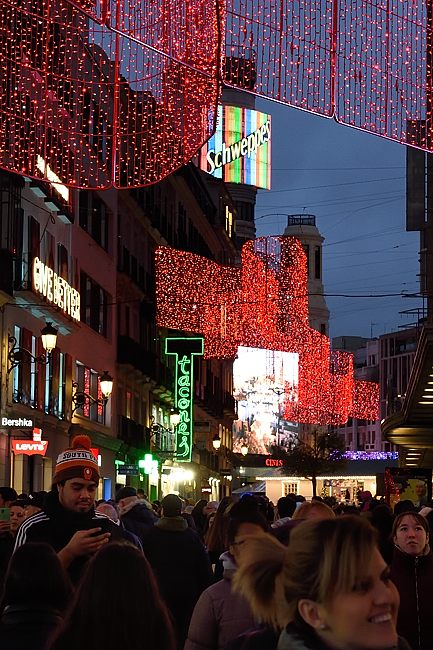
A good government strives to avoid needlessly upsetting its citizens, including citizens who voted for the opposition. Six plus years here have convinced me that any serious suggestion of ditching the monarchy can be unusually upsetting to some political conservatives, particularly older conservatives. I have seen expressions of worry not inspired by any other political subject.
The Second Republic. Azaña, Largo Caballero. Checas, paseos. Brrr! Even if you have absolutely no knowledge of Spain history, I suggest a look at the cover of this Second Republic history. (Author Pío Moa is strongly associated with Spain’s right.) Just look at it, consider the emotions that the photo montage inspires.
A constitutional monarchy, like Canada, Australia, the U.K., Sweden. Ain’t broke. Best left alone.
(A quick plug: I like a book by Luis Palacios Bañuelos about the Second Republic, which strikes me as even-handed.)
A PP supporter here points out that King Juan Carlos I played an unquestionably crucial role in Spain during the transition to democracy and the 1981 coup attempt, despite his sins in later years.
CINTURÓN ROJO
Liberal city center, conservative outskirts. I grew up with that stereotype in the U.S., saw little reason in Spain to question what I regarded as holy writ. (Although this Pew Research report tells me that the divide is more urban/rural than urban/suburban*.)
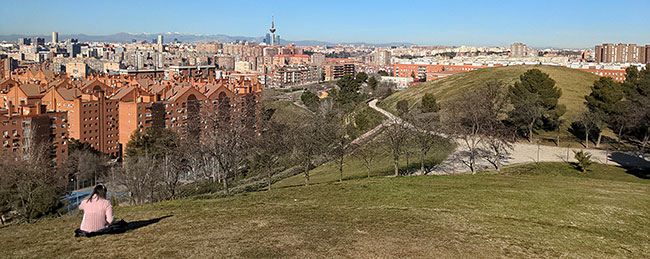
I was thus quite surprised to learn of Madrid’s cinturón rojo, a solidly left-leaning “red belt” of bedroom communities southwest of the urban nucleus. A wikipedia page says I’d find something similar on the outskirts of Paris. Go figure.
* Suburban, in the American use of this word, and emphatically not in the Spanish use. Suburbio here implies ghetto, slum. A dangerous false friend for language learners.
MY MADRID NIGHTMARE …
… has been that a Charles Koch or transit-hating, climate change denying, Cato or Heartland or Americans for Prosperity affiliated U.S. billionaire would strive seriously to suborn Spain politicians to undermine public transit here.
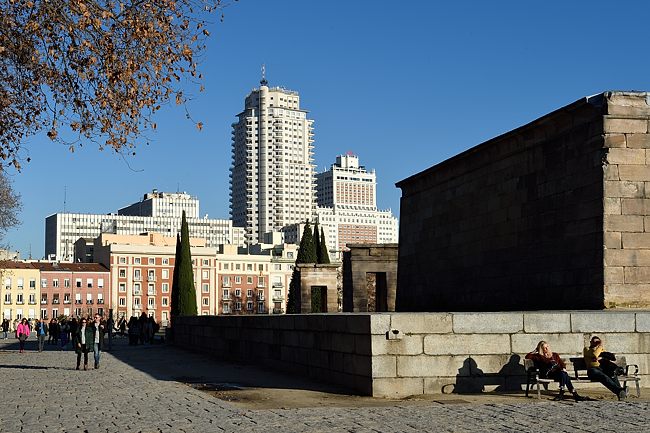
In spring, Madrid cited energy costs and reduced ridership while instituting a ten percent cut in service. Service frequency is now up dramatically to accommodate increased traffic during the holidays, but the cuts in spring gave me a scare, induced a neurotic upset disproportionate to the cuts’ effect on my personal travel. Cue a comparison to Spain conservatives’ distress after any suggestion of a third republic. They can be exagerados. On this issue, I can be, too.
I’m not going back to California-caliber public transit. I haven’t bolted awake beneath sweat-soaked sheets after a nightmare of circling Retiro Park in a S.F. Muni 14 bus, but could. This issue matters to me. And I fear it matters in a different way to principals in the ambit of the auto lobby, who know that more Americans are moving to Europe, that those Americans will talk to stateside friends about the trains and buses they ride here, that those statesiders will stop seeing a public bus as mobility fit only for a ciudadano de segunda, for a sad sack who lost his wheels in a repo or his license to a DUI conviction.
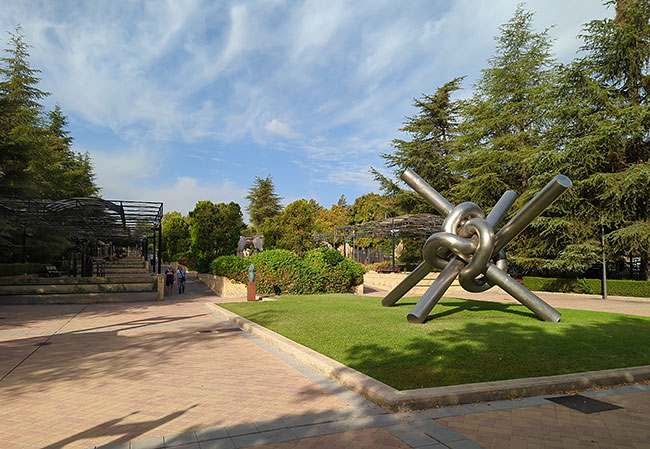
A gazillionaire with enough hay to spread around sometimes can make himself right, even if he was wrong before. I presume that Spain politicians have a practical need for money, campaign foot soldiers and good P.R., like their equivalents in the U.S. A humble straphanger can’t offer that help, but a Charles Koch could. We expats won’t gush about superior Western Europe transit if the quality of the transit can be steadily sabotaged under our feet.
I shared this nightmare with Andén 1 members after my September presentation, and was assured that it won’t happen here, for many reasons. Comunidad de Madrid operates the metro, and said Comunidad has been led historically by Popular Party leaders. It’s their crown jewel; why would they want to trash it? Further, Madrid’s high transit ride share means that millions of angry straphangers may pay back pols for service cuts on election day. The political landscape is different here. (Look at the design of metro line 12 and a desire to woo the cínturon rojo.) I’m safely in Western Europe, with Western Europe attitudes toward public transit. My nightmare can’t happen.
Still, I worry … unreasonably, emotionally, but I worry still. If I happen to wait a bit longer than usual for a subway, or board a car that’s a bit more crowded than usual. It’s too good to be true. They’re going to take it away. I’ll have to ride the 14 again. I picture the door of a Cadillac Escalade swinging open beside Ms. Ayuso on her next U.S. visit, discharging an aristocratic octogenarian (or so this nemesis appears, in my hand-wringing incubus, my dread), carelessly but expensively dressed, with folksy smile concealing a deadly cunning, daring to rest gnarled, calculating fingers on the Community President’s forearm.
“Isabel Ayuso, I like your style!”
Edit, 20230531: ¹ So am I ready to eat these words in the wake of the Popular Party’s election triumph last Sunday? Nope. Honest! Please note that right-voting Spaniards presume medical benefits, minimum annual leave and other EU welfare state perks little imagined in the United States. I stand by my opinion, although it is very much the opinion of Spain as viewed by a born-and-raised American.
² However, recent conversations convince me that these medical benefits are in poorer shape than I had thought when this post went live. In April, I chatted with a Spaniard who lives with daily pain — or discomfort, at least — while awaiting a hospital appointment for a hip problem. What was the earliest appointment she could arrange? In November, more than a half year away.
